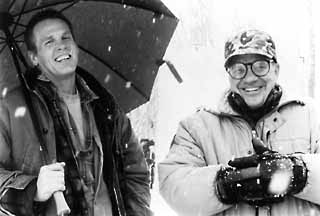Bad to the Bone
By Marjorie Baumgarten, Fri., Feb. 19, 1999
|
|
The affliction referred to in the title of Paul Schrader's new movie, which the writer/director adapted for the screen from a novel by author Russell Banks, has nothing to do with any pop disease of the week. No, the affliction addressed by the story roots deep in the human body; it resides in cavities too dark and inaccessible to be soothed by the illuminations and palliatives of modern medicine. The legacy of male violence is the affliction under the microscope here, a hereditary cultural ailment that's passed on from father to son.
Nick Nolte stars in this drama as Wade Whitehouse, the lone police officer in a small New Hampshire town whose damaged past leaves him ill-equipped to determine the present and shape his future. The son of an abusive and alcoholic father (James Coburn), Wade continues to live in the economically depressed town in which he was raised. He's divorced from his wife, who has remarried and moved away with their daughter. He broods over the possibilities of restoring these relationships, while also repeating the mistakes of the past with his new girlfriend Margie (Sissy Spacek). He looks in on his parents from time to time and monitors the state of his father. Suddenly, after a wealthy weekender in the area dies mysteriously, Wade sees the investigation of the death and the chance to solve a crime as his opportunity for redemption. Life steadily gnaws on Wade's nerves, much like the toothache that hounds him throughout the story.
"On the surface," says Schrader, "it's a story about a small-town cop who thinks a hunting accident is a murder. But underneath, it's about male violence -- the kind that's borne in the blood, bred in the bone, and passed on from father to son -- and how we escape or don't escape that kind of hereditary male violence."
Certainly, the exploration of violence and its misuse is an ongoing theme found throughout Schrader's body of work, both in those scripts he's written for others to direct and in those he's written and directed himself. It's a thread that can be followed in such early scripts as Taxi Driver and Rolling Thunder to more recent projects such as Patty Hearst, The Comfort of Strangers, and Light Sleeper. Even if this is the aspect of Banks' critically hailed novel which first attracted Schrader to the story and led him to option it, the addition of hereditary aspects to this analysis of the cycle of violence represents something of a new tack for Schrader. Although the two men shared a unity of vision for the filming of Affliction, Schrader admits that the hereditary factor is "a little more Russell's bailiwick than mine. I certainly was not the product of an abusive childhood, an alcoholic childhood. In that aspect, Russell's novel is more autobiographical to Russell than to me."
Schrader wrote the screenplay solo even though there exists a deep artistic harmony between the two authors. "I adapted, but because this piece is quite near to Russell's heart, he ended up being involved quite a bit," comments Schrader. "I think he came up to Montreal when we were shooting four times. And he hung in there through the years."
Other resonances occurred during the filming, such as the generational give-and-take between the father-and-son duo of Coburn and Nolte. In years, the two men are "not that far apart," observes Schrader. "They're only about 15-16 years apart, you know. But it's a whole different generation, a different mind sensibility in that generation gap there. One really the product of the Fifties and the other the product of the late Sixties. I mean, they had a grand time together but it was interesting watching them do scenes. ... The movie was very generational right there."
In its use of a murder mystery as the departure point for telling a story with broader human dimensions, Affliction finds Schrader once again on familiar turf. The conventions of genre form the backbone of many of his films: the murder mystery of American Gigolo, the Western dimensions of Hardcore, and the heist structure of Blue Collar.
So, too, Schrader's work is populated with characters whose behaviors are governed by their obsessions or their mistaken directions in life. Here, Affliction's Wade Lighthouse takes his place next to the driven protagonists of such films as Taxi Driver, Raging Bull, Mishima, Mosquito Coast, Old Boyfriends, and even The Last Temptation of Christ.
Yet, Schrader's depth of feeling for Affliction's characters is evident, as is his desire to illustrate at face value the circumstances in which they find themselves. "It's a completely non-ironic movie," he explains, "which, I guess, is saying something today, isn't it? At this juncture in American films, maybe the most radical thing you can do is not be ironic and just be heartfelt, be genuine."
A version of this article originally appeared in the 1998 Telluride Film Festival program book. Affliction opens in Austin theatres Fri, Feb 19.









